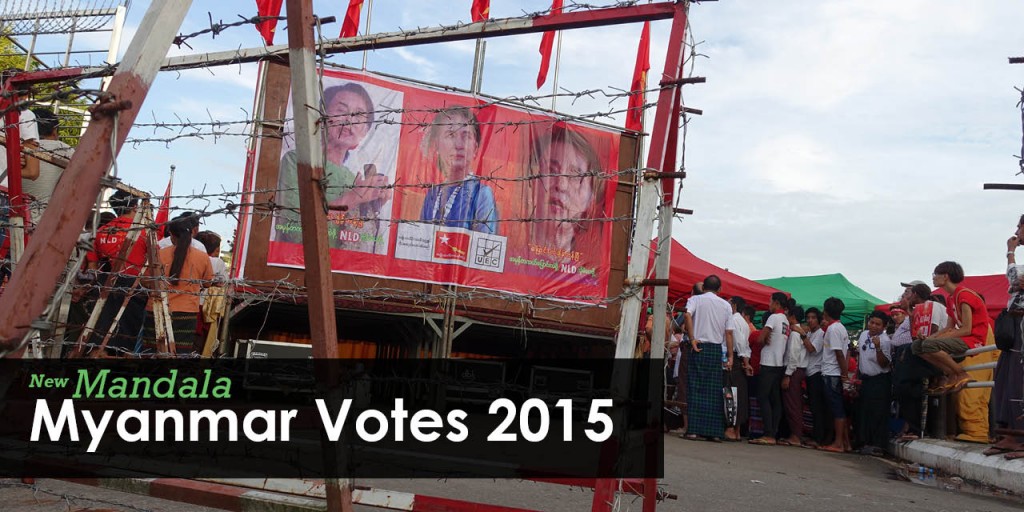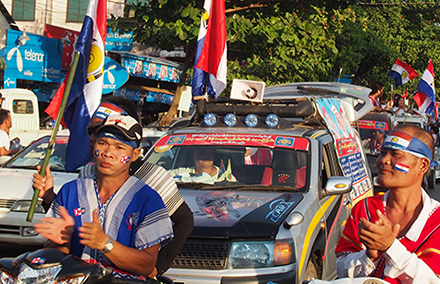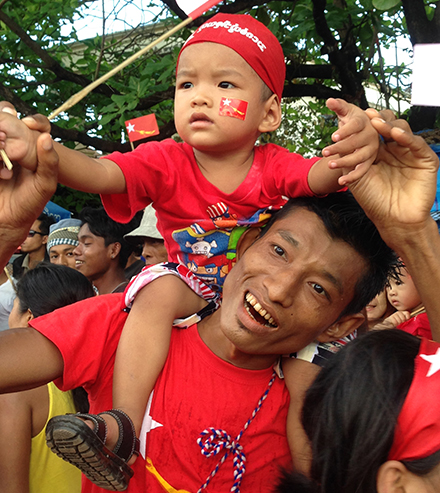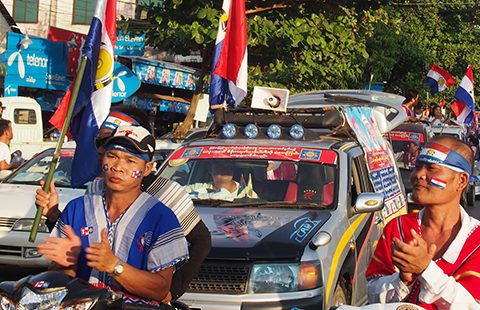
For ethnic voters in Karen State, Myanmar’s elections are a national affair, reports Justine Chambers.
Long associated with the conflict between the military junta and the Karen National Union (KNU) and its armed wing the Karen National Liberation Army, Hpa-an in eastern Myanmar is a space for outlaws, bandits and overlapping claims of sovereignty.
After British rule, Karen State collapsed into almost 70 years of civil war and sectarian and ethnic violence, witnessing the rise of a military willing to use brutal force against ethnic armed organisations and communities battling for greater autonomy.
Decades of instability and egregious human rights violations prompted mass displacement both internally and to Thailand where even today more than 120,000 refugees reside – their fate and the possibility of return is now intimately intertwined with the outcomes of Sunday’s elections.
Amid conflict and socio-economic stagnation, it is no surprise that in the Karen capital, identity politics loom large in the lead up to this Sunday’s election.
Many of the Karen parties explicitly hark back in their campaign speeches to the history of conflict with the Bamar-led military. Yet such messages are gaining only partial traction among voters whose focus is as much on national politics and culture as it is on local ethnicity and development.
With the area under strong government control since 1988 many locals say it is important to vote for a Karen party, one which represents their particular interests. As a local brick-maker explained to me recently: “How can we choose a Bamar party like the NLD and the USDP if we are Karen? They are strangers to us.”
The influential and powerful monk Taungalay Sayadaw concurs, telling me that the NLD doesn’t have much of a chance of winning many seats in Karen state. “Local people here don’t trust the big national parties. Even if the NLD gains a majority in Hpa-an township, nobody will vote for them in more rural areas of the district.”
These messages about ethnic loyalty -– often made by representatives of ethnic parties -– have prompted many domestic and international commentators to proclaim Hpa-an and other majority ethnic townships around the country, as being the likely domains of established ethnic parties from the 2010 election.
The Phalon-Sawow Democratic Party (PSDP) is a good example. This election the party is fielding 46 candidates and their focus on ethnic affairs remains strong as ever. As they told villagers in a recent campaign on the outskirts of Hpa-an, “We are Karen. You are Karen. We must stand united together.”
With the benefits of incumbency behind them – PSDP candidates have held the Kayin State Ministries for Electricity and Roads for the past five years – such claims carry material weight. As one PSDP candidate explained to voters during a recent campaign: “We already brought electricity to the village near here, so you can trust us that we will do the same for you.”
Certainly for some voters promises of new roads and electricity hold sway. However, for some they have come too little, too late. “They have had five years in government and nothing has changed for us,” one Karen man explains to me. “I am going to give another party my vote. We need a clean and fresh party.”
Indeed, while the 2010 election saw ethnic parties wrap-up the majority of seats with promises of local development, the inclusion of Aung San Suu Kyi’s National League for Democracy (NLD) this year has changed the stakes of the elections. For many voters, Sunday’s poll is a chance to cast a ballot not just for a party that represents their ethnicity, but also to grasp for a more democratic Myanmar after decades of authoritarian rule.

Photo: Justine Chambers
This national consciousness isn’t surprising. In districts like Hpa-an many locals see themselves not just as ‘ethnic minorities’ but also as citizens of the Union of Myanmar especially those in urban wards. One prominent Karen Christian leader told me:
This is not just a vote for Karen people, but for our whole country. We need to choose the best candidate who can improve the lives of our people and change our country in meaningful ways – regardless of ethnicity or religion.
As in the rest of the country, for many people this national mindset means voting for the NLD and Daw Aung San Suu Kyi, in the hope that she will be able to bring genuine democracy and ‘real change’ to Myanmar. While electoral analysts and journalists have criticised this campaign strategy, for local people the simple messaging of change resonates.
Tapping into the hopes of an electorate long scarred by armed conflict and related widespread poverty, the NLD represents for many people the peace, freedom, security and justice they crave after so many years of fighting and stagnation.
“Aung San Suu Kyi is our mother,” one Buddhist Karen woman tells me. “It is her time to lead our country and unite our people. She will bring real peace here.”
It’s a sentiment shared by many first-time voters who have grown up under the government’s education system, spending years learning and reciting the achievements of Bogyoke Aung San and his quest to unite Myanmar. These young voters see themselves as a part of the Union and are eager to stand for the nation-wide change that will not only benefit them, but their fellow citizens with similar goals and values.
The Hpa-an born, NLD candidate for the Karen state parliament, Nan Khin Htwe Myint,,speaks directly to these experiences – having been jailed three times over her lifetime under the former military regime, the first when she was 19. She has been campaigning hard since mid-September, and believes she can win.
“The USDP and Karen parties currently in government make a lot of promises, but everyone knows that nothing has really changed here”, she claims.
The realities of national change are also leading some to support the ruling USDP. Many write the military-aligned party off in a post-conflict area like Hpa-an. Yet the reforms instituted by the Thein Sein government over the last five years – including telecommunications, infrastructure and economic liberalisation – have brought substantive change to many people’s lives here.
In particular, the recent nation-wide ceasefire agreement – which included the KNU as well as other prominent local Karen armed groups – is recognised by many as something no other government has been able to achieve in nearly seven decades.

Photo: Justine Chambers
While the USDP may not have been as loud or vocal in Hpa-an as other parties in recent weeks, they are certainly not backing down without a fight, reminding locals that they are the only party capable of seeing through the country’s transition. As one woman told me, “I voted for the USDP in 2010 and I will vote for them again. A lot has changed here because of them. They are the only party that can protect our people, religion and our country’s development.
Religious concerns also loom large over the Buddhist-majority communities in and around Hpa-an, where the messages of Buddhist nationalist group Ma Ba Tha have spread into many corners of the district. Just as in much of the country, Buddhist nationalism and anti-Muslim sentiment plays a strong and influential role here. In daily conversations with people from differnt demographic and ethnic backgrounds one thing can be found; concerns about what is seen as the ‘Muslim threat’.
Rumours insinuating Aung San Suu Kyi is too sympathetic to the ‘human rights’ of Muslim communities, perceived by many as being ‘outsiders’, are especially rampant ahead of the election. As a result, many claim that the NLD is the ‘Kalar Party’ and that they must therefore vote for the USDP or the more recently established, regime-linked National Development Party (NDP) – parties they say will “protect national religion”.
Given the USDP’s association to the bloody military campaigns around Hpa-an, the NDP provides a potential third party for ethnic voters with nation-wide religious concerns. While only a few months old, the NDPs strong promotion of the Race and Religion Protection Laws and local alliance with the Zwegabin Sayadaw also puts them in good favour with many devout Buddhists.
With this complex interplay of local, national and religious affairs, it is no surprise that many people remain undecided about their vote – perplexed by the multitude of ethnic and national parties and candidates running in Hpa-an. One young woman exclaimed to me recently: “I am so confused… I wish they would just speak honestly about why we should vote for them.”
Some are also reluctant to specify their party preference, with many insisting they are not interested in politics or voting. Most are realistic about their expectations from the election, knowing that change cannot happen overnight especially when many politicians and leaders are untrustworthy. Many suggest that all candidates are all seen to be cut from the same cloth – self-interested and power hungry. As one grandmother adamantly expressed, “We have always had to look after ourselves, and this election is not going to change that.”
Regardless of the outcome of the 8 November elections, it is clear that for many in Hpa-an they want their voice to be heard not just by their fellow Karen but by the Bamar-majority parties and institutions that have ruled the country for so long.
If they don’t listen, then as one third-year university student insists gleefully, “we’ll vote again in five years and kick them all out!”
Justine Chambers is a PhD student at the Australian National University’s College of Asia and the Pacific and Endeavour Postgraduate Scholar at Chiang Mai University.
 Facebook
Facebook  Twitter
Twitter  Soundcloud
Soundcloud  Youtube
Youtube  Rss
Rss 